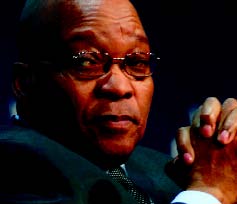On 9 May 2009, Jacob Zuma became South Africa’s President – only the fourth black leader in the country’s history – after his African National Congress won 66 per cent of the vote and 264 parliamentary seats in general elections.
Following the vote, President Zuma pledged to lead South Africa toward a united, non-racial, non-sexist future, promising to create jobs, fight poverty and deliver more social services to South Africans – 40 percent of whom live on less than $2 per day.
Analysts say one of the greatest challenges for the long-time ANC deputy leader will be to satisfy the aspirations of the poor, union workers and left-leaning members of his party, while maintaining the confidence of businessmen and foreign investors.
Zuma’s path to success has been overshadowed by several scandals. Four years ago, his political career was all but written off after allegations of rape and corruption were made against him. Weeks before this year’s polls, the National Pro-secution Authority threw out the case after finding phone-tap evidence which suggested there had been political interference in the investigation.
In 2006, Zuma was also acquitted of raping an HIV-positive family friend. But his statement during the trial that he showered after unprotected sex with the woman to guard against possible infection provoked criticism and ridicule, and some analysts predicted he would divide the female vote. Yet his popularity seems undiminished, especially among his fellow Zulus.
Jacob Zuma was born on 12 April 1942 in Inkandla, in what is now KwaZulu-Natal. He did not receive any formal schooling but, heavily influenced by a trade unionist family member, he became involved in politics at an early age and joined the African National Congress in 1959, going on to become an active member of Umkhonto we Sizwe in 1962.
Convicted of conspiring to overthrow the government in 1963, he was sentenced to 10 years’ imprisonment, which he served on Robben Island.
After his release, Jacob Zuma helped mobilise internal resistance. He left South Africa in 1975 and for the next 12 years – based first in Swaziland and then Mozambique – he dealt with thousands of young exiles who poured out of South Africa in the wake of the Soweto uprising.
Zuma was forced to leave Mozambique in January 1987 after considerable pressure on the Mozambican government by the PW Botha regime. He moved to the ANC head office in Lusaka, Zambia, where he was appointed Head of Underground Structures and shortly thereafter Chief of the Intelligence Department. He also served on the ANC’s political and military council when it was formed in the mid-1980s.
Following the un-banning of the ANC in February 1990, Zuma was one of the first ANC leaders to return to South Africa to begin the process of negotiations. In 1990, at the first regional congress of the ANC in KwaZulu-Natal, he was elected chairperson of the Southern Natal region and took a leading role in fighting violence in the region. This resulted in a number of peace accords involving the ANC and the Inkatha Freedom Party.
Four years later, he was nominated as the ANC candidate for the premiership of the KwaZulu-Natal province. He is generally regarded as the person most instrumental in achieving the peace that is now enjoyed by the people of the province, and in October 1998 he was honoured with the Nelson Mandela Award for Outstanding Leadership in Washington DC, USA.
Like many leaders of his Zulu community, Zuma is a polygamist, and has been married at least five times.












